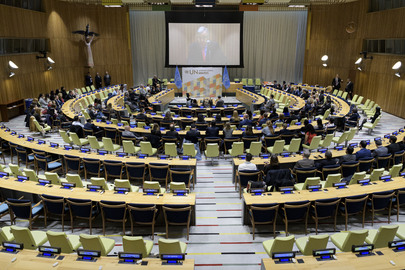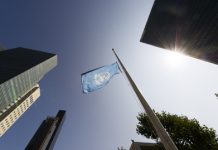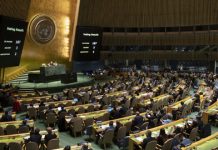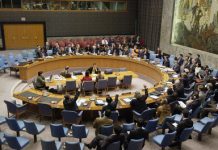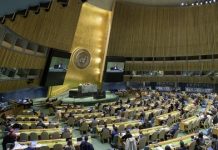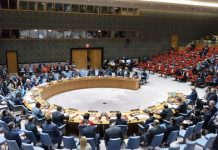One woman is killed every 10 minutes by intimate partner or family member
Sobering news on the International Day of Violence Against Women – which is marked on Monday – that one woman or girl is killed every 10 minutes, at the hands of their partner or a family member.
According to UN data, at least 51,100 women and girls died in this way globally in 2023.
A new report from UN Women and the UN Office on Drugs and Crime (UNODC) points out that violence against women and girls remains largely unreported, owing to “the impunity, silence, stigma and shame surrounding it”.
Mexican activist Norma Andrade visited UN Geneva recently to raise awareness about femicide, after the murder of her daughter, Lilia Alejandra, in the town of Ciudad Juárez, on the border with the United States in 2001.
Norma has survived two attempts on her life in the 23 years since her daughter’s body was discovered, as she continues to fight for justice:
“In Mexico, the excess of disappearances is real, but this boom in organized crime, drug trafficking has erased what is happening with women. Not because it has stopped happening. It still happens, but it is becoming invisible…And even though the violence against women is increasing, its visibility is going down… There are so many problems in the country that they make women’s problems invisible and the authorities no longer take them into account.”
Regional data shows that femicide transcends borders, socio-economic status and cultures, but its severity varies. Africa recorded the highest rates of intimate partner and family-related femicides, with 21,700 women killed in 2023, followed by the Americas and Oceania.
In Europe, 64 per cent of victims were killed by their intimate partners; in the Americas, it was 58 per cent.
In contrast, women in Africa and Asia were more likely to be killed by family members than by their partners.
Gaza: UN’s Tedros alert over stricken Kamal Adwan Hospital
To Gaza, where a stricken hospital in the besieged north has continued to come under attack, injuring the facility’s director “and the very few remaining doctors and nurses” there, the head of the UN World Health Organization (WHO) said on Monday.
The development follows reports of a drone attack on Thursday night on Kamal Adwan Hospital that damaged the electricity generator, cutting oxygen lines and the water supply.
In an alert, WHO Director-General Tedros Adhanom Ghebreyesus said that Kamal Adwan Hospital still has 86 patients of all ages; eight are in intensive care.
“The attacks on Kamal Adwan Hospital must stop immediately,” Tedros warned in an online post, as he called for “safe passage for a humanitarian mission…so that health personnel can be deployed and medical supplies provided for the remaining patients”.
Meanwhile the UN agency for Palestine refugees, UNRWA, has reported that families fleeing Jabalia in the north say that it has been “absolutely flattened”.
UNRWA Senior Emergency Coordinator Louise Wateridge has been speaking to UN News:
“It’s just really, really desperate in terms of trying to find shelter for people. We’ve got around 300,000 people now in Gaza City and it’s rubble; it’s just rubble. They need tarps, they need tents, they need shelter. They don’t have blankets, they don’t have mattresses. They are just out in the open…It has almost been 50 days with denied or impeded access to besieged north Gaza.”
UNRWA said that since the siege of northern Gaza began, Israeli military operations have hit 17 of the agency’s shelters there, and another six in Gaza City where displaced families from the besieged north had re-located.
Talks begin in South Korea to clinch a deal on plastics pollution – UNEP
Talks are underway in Busan, South Korea, to clinch a deal on plastic pollution, led by the UN Environment Programme, UNEP.
The summit follows two years of intergovernmental negotiations to develop an internationally legally binding agreement that covers land and the marine environment.
UNEP Executive Director Inger Anderson insisted that it was “the moment of truth” to take action. “Not a single person” on the planet wants plastic washing up on their shores or plastic particles circulating in their bodies, including the G20 group of nations, she said:
“Waste pickers, civil society groups, are fully engaged. Businesses are calling for global rules to guide this future. Indigenous people are speaking out. Scientists are calling out the science. The finance sector is beginning to make the moves. At the international level, there’s also been clear signals that a deal is essential, including the G20 declaration last week, which said that G20 leaders were determined to land this treaty by the end of the year.”
More than 170 countries and over 600 observer organizations have registered for one week of talks, where South Korea President Yoon Suk Yeol urged delegates to agree on a path to zero plastic pollution, for the sake of future generations.
Daniel Johnson, UN News.
Music composed and produced by Joachim Harris. All rights reserved
Source of original article: United Nations (news.un.org). Photo credit: UN. The content of this article does not necessarily reflect the views or opinion of Global Diaspora News (www.globaldiasporanews.com).
To submit your press release: (https://www.globaldiasporanews.com/pr).
To advertise on Global Diaspora News: (www.globaldiasporanews.com/ads).
Sign up to Global Diaspora News newsletter (https://www.globaldiasporanews.com/newsletter/) to start receiving updates and opportunities directly in your email inbox for free.


